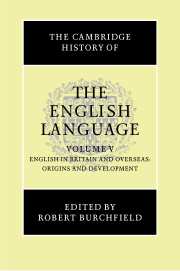Book contents
- Frontmatter
- 1 Introduction
- PART I Regional varieties of English in Great Britain and Ireland
- PART II English overseas
- 6 ENGLISH IN AUSTRALIA
- 7 ENGLISH IN THE CARIBBEAN
- 8 ENGLISH IN NEW ZEALAND
- 9 ENGLISH IN SOUTH AFRICA
- 10 ENGLISH IN SOUTH ASIA
- Glossary of linguistic terms
- Bibliography
- Index
- THE CAMBRIDGE HISTORY OF THE ENGLISH LANGUAGE
- Map 7.1 Movements of English/Creole speakers in the seventeenth century
- Map 7.2 Movements of English/Creole speakers after 1700
- References
8 - ENGLISH IN NEW ZEALAND
from PART II - English overseas
Published online by Cambridge University Press: 28 March 2008
- Frontmatter
- 1 Introduction
- PART I Regional varieties of English in Great Britain and Ireland
- PART II English overseas
- 6 ENGLISH IN AUSTRALIA
- 7 ENGLISH IN THE CARIBBEAN
- 8 ENGLISH IN NEW ZEALAND
- 9 ENGLISH IN SOUTH AFRICA
- 10 ENGLISH IN SOUTH ASIA
- Glossary of linguistic terms
- Bibliography
- Index
- THE CAMBRIDGE HISTORY OF THE ENGLISH LANGUAGE
- Map 7.1 Movements of English/Creole speakers in the seventeenth century
- Map 7.2 Movements of English/Creole speakers after 1700
- References
Summary
Introduction
The European settlement of New Zealand
New Zealand was first discovered by Polynesian explorers around AD 925, if Maori genealogies can be trusted, and was settled by AD 1150. It was rediscovered by the Dutch in 1642. The only linguistic result of that rediscovery is the name New Zealand, given not by Abel Tasman himself – he called it Staten Land, under the misapprehension that it was part of Australia – but by Dutch geographers later in the seventeenth century. James Cook visited New Zealand in 1769 and circumnavigated the islands. He was the one who claimed New Zealand for the British Crown, beating French interests by a matter of weeks. He was also the first to use Maori words in his written English.
From about 1792 onwards, whalers and sealers visited and operated from the coasts of New Zealand. There were some French ships involved, as well as British and American ones, but the lingua franca was probably English. In 1814 the arrival of Anglican missionaries was marked by a Christmas Day service conducted by the Reverend Samuel Marsden. Catholic missionaries from France arrived later, from about 1838, but do not appear to have had any linguistic consequences on New Zealand English.
Keywords
- Type
- Chapter
- Information
- The Cambridge History of the English Language , pp. 382 - 429Publisher: Cambridge University PressPrint publication year: 1994
References
- 30
- Cited by

